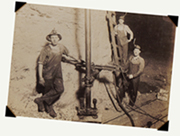The History of Duenweg, MO
 The City of Duenweg has a long and varied history, starting out as a lead and zinc mining community. The town’s history reaches all the way back to the Osage Indians who were tall and not inclined to hostility. The principles of the people in the community are built on strong morals and an adamant emphasis on the need for a strong education for the children of the community.
The City of Duenweg has a long and varied history, starting out as a lead and zinc mining community. The town’s history reaches all the way back to the Osage Indians who were tall and not inclined to hostility. The principles of the people in the community are built on strong morals and an adamant emphasis on the need for a strong education for the children of the community.
In the year 1855, two brothers, Elijah C. and James C. Webb, from Overton County, Tennessee, came to Southwest Missouri and settled in the area that eventually became Duenweg. Two of their nephews, Thomas C. and Solomon Webb, also settled in the area to make their homes and raise their families. The Civil War called to arms eight hundred men from the Duenweg community who fought for both the Union and Confederate forces.
How Duenweg Got It’s Name
 Otto Duenweg and his father, Louis, of Terre Haute, Indiana, had been interested in the mining district since 1894. Their first investments in Missouri were made by Louis Duenweg, in Aurora. In that same year both Louis and Otto were associated in the opening of The Silver Dick mine in Center Valley, north of Webb City. A year later, in 1895, a new camp southeast of Webb City, where G. P. Ashcraft and J. Allen Hardy had been opening up some great lead diggings, attracted the attention of the Indiana capitalists. The Duenwegs purchased some of the largest of the newly discovered mines. The mining camp became known from that time on as “Duenweg”, in honor of the men who had undertaken the development of this new territory.
Otto Duenweg and his father, Louis, of Terre Haute, Indiana, had been interested in the mining district since 1894. Their first investments in Missouri were made by Louis Duenweg, in Aurora. In that same year both Louis and Otto were associated in the opening of The Silver Dick mine in Center Valley, north of Webb City. A year later, in 1895, a new camp southeast of Webb City, where G. P. Ashcraft and J. Allen Hardy had been opening up some great lead diggings, attracted the attention of the Indiana capitalists. The Duenwegs purchased some of the largest of the newly discovered mines. The mining camp became known from that time on as “Duenweg”, in honor of the men who had undertaken the development of this new territory.
Otto Duenweg was only 25 years old when the town was given his last name. He died just 13 years later, August 14, 1908, in Manitou Springs, Colorado, after undergoing emergency surgery. Mr. Duenweg was on a vacation trip with a group of friends from Webb City, when he was stricken with an illness.
The Duenweg Bank Robbery
On the morning of February 17, 1915, the Duenweg Bank, which was established in February of 1912, was robbed, at approximately 11:40 a.m. The men fled the bank with $1,806.50, after locking the cashier, F. B. Wilkinson, in the vault. He later freed himself. Failing to catch a street car proved to be the downfall of the three would-be bandits.
According to newspaper accounts of the event, “the men missed a street car by one minute, which they hoped would convey them to Joplin, and were forced to attempt escape on foot.” The three were arrested about an hour after the holdup, when officers and a posse of Duenweg citizens surrounded them “near a hedge fence, one and one-half miles southwest of Duenweg.” Less than four hours after the robbery, the fugitives had confessed, waived preliminary trial, were ordered held in circuit court, and were routed to the county jail at Carthage.
Most of the money was recovered at the time the trio was arrested, while the rest was found at the side of the road, where it had been dropped by the fleeing bandits.
Duenweg Becomes a City
 On January 6, 1954, Earl Cunningham, Harley Mac Needham, Charles Little, Melton Mitchell and others, appeared with their attorney, Dalton DeShazer, to present their petition to the Jasper County Court to have the town of Duenweg incorporated. The court declaration stated that it be “ordered, adjudged and decreed by the Court that the corporate powers and duties of said town so incorporated shall vest in a Board of Trustees, to consist of five members, and that Charles Little, Melton Mitchell, Lloyd Rogers, Eugene Parker and Harley Mac Needham be thereby appointed as members of the first Board of Trustees”. They held their appointed offices until their successors were “duly elected and qualified as provided by law”. The incorporation document was signed by Frank V. Smith, Presiding Judge; Roland Shadday, Judge of the Western District; and Walter D. Frost, Judge of the Eastern District. Duenweg’s first mayor, Eugene (Gene) Parker was appointed from that first Board of Trustees.
On January 6, 1954, Earl Cunningham, Harley Mac Needham, Charles Little, Melton Mitchell and others, appeared with their attorney, Dalton DeShazer, to present their petition to the Jasper County Court to have the town of Duenweg incorporated. The court declaration stated that it be “ordered, adjudged and decreed by the Court that the corporate powers and duties of said town so incorporated shall vest in a Board of Trustees, to consist of five members, and that Charles Little, Melton Mitchell, Lloyd Rogers, Eugene Parker and Harley Mac Needham be thereby appointed as members of the first Board of Trustees”. They held their appointed offices until their successors were “duly elected and qualified as provided by law”. The incorporation document was signed by Frank V. Smith, Presiding Judge; Roland Shadday, Judge of the Western District; and Walter D. Frost, Judge of the Eastern District. Duenweg’s first mayor, Eugene (Gene) Parker was appointed from that first Board of Trustees.
Only seven other men have been elected to serve as mayor of the City of Duenweg: Earl Cunningham, Portor Johnson, Kenneth Neal, Albert Wolfe, Earl Wayne Goddard, Charles Cossey and Russell Olds. Donald Johnson served as Mayor Pro-tem for a short time, following the resignation of Earl Wayne Goddard.
Notable Events
- Gundar Dullum, a Duenweg hero, took part in expedition into Mexico in pursuit of the bandit, Pancho Villa under the command of General John J. “Black Jack” Pershing.
- In WW II Private First Class Clarence Lee Evens was killed in action after having destroyed two Japanese machine-gunners nests. For his efforts he was awarded the Navy Cross, a Purple Heart and several campaign ribbons.
- In 1958 the Duenweg Volunteer Fire Department was established. They purchased a 1941 fire truck. At that time the department had eleven volunteers.
- An annexation that went into effect on January 1, 2002 expanded the northern boundary of Duenweg to Newman Road and the southern boundary to 20th street.
